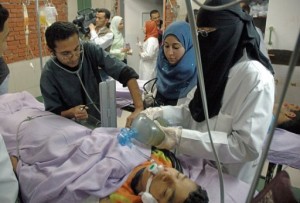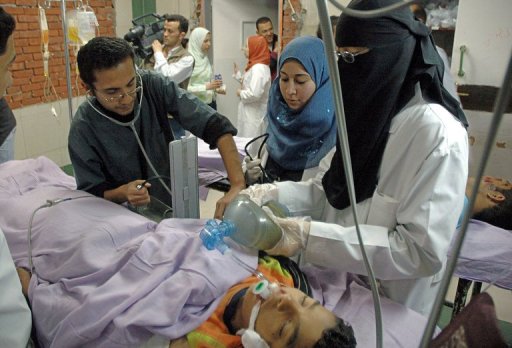As doctors resume their partial strike, some face administrative intransigence from superiors who oppose the strike.
“[They are being threatened] that they would get deductions on incentives, allowances and any of the doctors’ sources of income outside their fixed wages, said Mohamed Shafiq, a member of the media team of the elected committee which is managing the doctor’s strike. “Only a fifth of a doctor’s average income comes from their fixed wage and the rest is tied to their performance,” he added.
In addition, “they have been threatened with arbitrary transfer or an end of extension because a doctor usually spends four years in one hospital learning, so the term can be ended after two years instead of being allowed to carry out their four years,” Shafiq said. Doctors on strike have also received threats that complaints against them will be filed with the police for, “threatening vital institutions.”

The doctors’ strike is in its second week. To escalate their action without harming patients, doctors have implemented a “free treatment strike,” whereby patients at state-run Ministry of Health hospitals are treated and examined for free in the emergency or reception departments.
However outpatient clinics, which patients are charged for, are being closed during the strike. “We have largely succeeded in doing that and whenever possible we referred patients to the emergency department to treat them for free,” said Shafiq.
“The Ministry of Health is our main rival and we want it to lose money,” he said. So far, the ministry has lost millions of pounds.
The latest figures from 22 governorates published by the committee elected during the general as
sembly of the Doctors’ Syndicate last month show that 100 per cent of doctors are striking in the governorate of Port Said and 95 per cent in Suez.
Following a five hour emergency meeting by the committee, the committee announced that there will be an ongoing strike every Tuesday across the country in front of major hospitals to make the public aware of the doctors’ demands.
“There were protests today in Ahmed Maher Hospital and in Mansheyet Al-Bakry and Shobra in Cairo. There were also protests in Dakahliya and Alexandria as well as in Dahab in South Sinai,” said Shafiq.
In his two hour speech on 6 October, President Mohamed Morsy mentioned the doctor’s strike but his reference to it didn’t please the doctors.
Morsy said that while the demands for a wage law are fair and that he has approved of a new wage law as of the next fiscal year, he thinks that the doctors’ decision strike is not “legitimate” as the patients are not at fault.
Ahmed Hussein, a doctor who started, then aborted, a hunger strike last month, criticised Morsy’s reference to the doctors’ strike, saying, “you have addressed the people and told them that the demands of the doctors are limited to the wage law.”
The doctors have three demands: the passing of a new wage law which gives doctors a minimum wage of EGP 3,000 per month; providing greater security at hospitals; and increasing the percentage of the budget allocated to healthcare.
Asked if the strike would be resumed if a new wage law were to be passed next month as claimed by officials, Shafiq said doctors’ demands are not limited to wages.
If the doctors’ demands are not met, some plan to offer their resignations. They say resignations will not be handed in until the number collected is at least 15,000. However, the Doctors’ Syndicate released a statement on 8 October stating that this step is not among the decisions taken by the general assembly.

